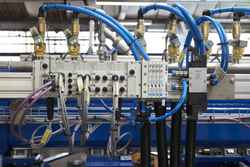
Posted to News on 13th Jan 2014, 13:48
Cutting machine costs without sacrificing functionality
In the late 19th century, potter and Englishman Thomas Twyford secured his place in history as one of the pioneers of "sanitary science' when he built the first modern-looking toilet; a one-piece, all-china design that he would refine and promote for the good part of a decade. Almost 130 years later, technology such as Festo's pneumatics equipment and CPX modular automation platforms are allowing developers and producers of sanitaryware pressure casting systems, PCL Ceramics, to continue to improve upon Mr Twyford's original idea but in much less time and as cost-effectively as possible.

When PCL Ceramics was tasked with decreasing its machine building expenditure as part of an overall cost-reduction programme, it sought expert advice from Festo in order to understand how technology could help it achieve this objective without sacrificing the functionality or safety of its machines.
PCL Ceramics develops and produces sanitaryware pressure casting systems with machine configuration options ranging from simple manually de-moulded systems to fully automated robotic systems.
As a long-term Festo customer utilising traditional products like multi-pin valve terminals, cylinders and air preparation equipment, the company had already introduced the Festo CPX modular automation platforms on its machines around 7 years ago. However, as part of a cost-reduction programme to help target lower-cost markets, it needed to implement further savings.
Nick Riddington, engineering manager at PCL Ceramics, says: "We did not want to make any engineering or safety compromises but we realised that we did not need all the sophisticated diagnostic features of the CPX-MPA-S on all our machines. Our machine is used for casting sanitaryware and operates in a process-type environment where motors pump liquid "mud' into pressurised moulds in a controlled sequence, after which there is a setting period for around 20 minutes. At the end of the process, the moulds are automatically opened and a robot enters the process area to unload the casting machine before the moulds are closed for the whole process to start again."
Festo supplies the pneumatics equipment for PCL Ceramics' machines, but the main benefit that continues to secure the company's business is the functionality of the CPX system - especially features such as the additional power supply mounted under the I/O modules, which provides additional safety functionality.
Valve island
Nick Riddington explains: "The major advantage to us is that we can power the outputs using separate independent power supplies. We can have the benefit of a valve island with many valves alongside each other and then we can operate a completely separate valve with its own air supply which can be at a higher air pressure supplying solenoids on the valve island."
Safety is, of course, a major consideration for PCL Ceramics, and the entire process area is surrounded by a safety perimeter fence to prevent workers from entering during operation. But, during the 20-minute casting cycle, when there is no movement staff are allowed into the cell. Therefore a two-tier safety system is in operation where if an operator opens the perimeter guarding gate, the robot cannot move and the mould will not open, although the machine carries on its casting process.
Nick Riddington explains: "The additional power supplies on the valve islands allow us to have the two-tier safety system, where we can feed valves with a separate 24V supply. This means that when the perimeter gate is opened, some valves are isolated and will not operate while others will. The "lower' tier applies when you open the gate and that only affects the valves associated with movement on the machine. If you hit an emergency stop, power to all the other valves on the machine is isolated, guaranteeing the safety of the process."
PCL Ceramics has recently adopted the MPA-L valve option on the CPX manifolds on its newer machines. The rationale for this change is that this reduced the cost of the manifolds whilst retaining the full flexibility and function integration of the electrical CPX. A further CPX manifold is used purely as an electrical I/O module without valves, while eight others are combined electrical and pneumatic valve combinations distributed around different parts of the machinery.
Nick Riddington adds: "The ability of the CPX system to offer pneumatic and electrical isolation and zoning allows us to build a cost-effective solution that incorporates the safety features we need."
Each station communicates by fieldbus (Festo valve terminals offer more than 20 fieldbus options) effectively providing one "control transparent' line of valve terminals. The new design of single mould machines will use not only CPX and MPA-L but also Festo equipment including rodless cylinders, reservoirs, air preparation equipment and gauges.
Nick Riddington also likes the fact that because the valves and I/O have ingress protection to IP65 and IP67, the CPX and I/O modules can be mounted directly on a machine at eye level instead of inside a cabinet elsewhere taking up space on the factory floor. He says: "The casting process is quite messy with lots of water and mud, and although we mount the valves at a relatively high level, operators wash the machines down with hoses which means that the valves can get wet or dirty."
This combination of quality pneumatic equipment with the modular automation functionality of the CPX systems has allowed Festo to assist PCL Ceramics in meeting its requirement to design systems that offer the right functionality but at the right price for the target market. To learn more about Festo's pneumatics equipment and CPX modular automation platforms, please visit www.festo.co.uk.
Want the latest machine building news straight to your inbox? Become a MachineBuilding member for free today >>

















